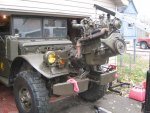- 1,177
- 27
- 0
- Location
- Northern Minnesota
It's totally illogical but I've picked up an engine noise in the M37 (Pumpkin) engine.
What's illogical about it is the engine was completely rebuilt, clear down to boiling the block, boreing .030 over --- the works several years ago. Granted, it was several years ago but I would guess it doesn't have over 200 hours on it and it's certainly never been abused or reved over 2,500 RPM.
The noise started out about a month ago as a slight peck/clunk when I started it up in these cold Minnesota mornings. The only time you could hear is was when it was under a slight load. Running along at 4 or 5 MPH in first gear it would make noise when the engine was pulling. Once you let your foot off and let it coast it would quiet down. It would also quiet down when it warmed up.
It's now getting louder.
It doesn't sound or act like a rod. It's got good oil pressure that holds steady through all RPM ranges regardless is your climbing on it or getting out of it.
I did a compression check. All cylinders are between 135 and 150 pounds compression. When you pull number-one plug wire off it quits making noise.
It could be a front main but I doubt it. I think it's a cracked piston skirt or a pin. The question is, what the heck would cause that to happen to a fresh non-abused engine. I could see a piston skirt cracking on an engine that had some cylinder wear (piston slap) but this engine was bored 200 hours ago and new pistons (and pins) installed.
I'll know more tomorrow. Soldier number one and I are pulling the head and pan tomorrow morning along with number-one piston.
More to follow.
PS: Do you think because these engines have a long stroke that cold morning starts could crack a piston? It goes without saying that I doNOT rev up the engine until it's good and warmed up. I'm running 10W30 motor oil.
What's illogical about it is the engine was completely rebuilt, clear down to boiling the block, boreing .030 over --- the works several years ago. Granted, it was several years ago but I would guess it doesn't have over 200 hours on it and it's certainly never been abused or reved over 2,500 RPM.
The noise started out about a month ago as a slight peck/clunk when I started it up in these cold Minnesota mornings. The only time you could hear is was when it was under a slight load. Running along at 4 or 5 MPH in first gear it would make noise when the engine was pulling. Once you let your foot off and let it coast it would quiet down. It would also quiet down when it warmed up.
It's now getting louder.
It doesn't sound or act like a rod. It's got good oil pressure that holds steady through all RPM ranges regardless is your climbing on it or getting out of it.
I did a compression check. All cylinders are between 135 and 150 pounds compression. When you pull number-one plug wire off it quits making noise.
It could be a front main but I doubt it. I think it's a cracked piston skirt or a pin. The question is, what the heck would cause that to happen to a fresh non-abused engine. I could see a piston skirt cracking on an engine that had some cylinder wear (piston slap) but this engine was bored 200 hours ago and new pistons (and pins) installed.
I'll know more tomorrow. Soldier number one and I are pulling the head and pan tomorrow morning along with number-one piston.
More to follow.
PS: Do you think because these engines have a long stroke that cold morning starts could crack a piston? It goes without saying that I doNOT rev up the engine until it's good and warmed up. I'm running 10W30 motor oil.



